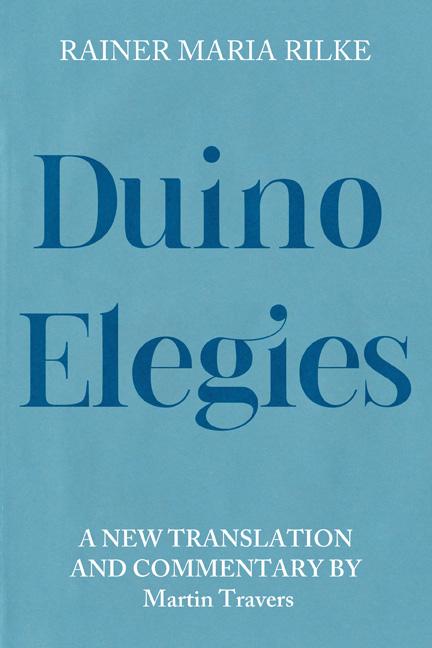Elegy 1
Published online by Cambridge University Press: 10 January 2024
Summary
The first Elegy introduces the major themes of the Duino Elegies: the common imperfection of humankind, compared to the unreachable perfection of the Angel; the debilitating effect of self-consciousness, where authentic Being eludes us; the failure of love to escape the games of selfhood (and it seems that the only true lovers are dead lovers); the extended but inconclusive meditations on what a real self might be; the tension between the will to transcendence and a pained grasping of the impossibility of the same; and the rewriting of death as a hope for the living. The first Elegy also gives expression to a lyrical subject whose voice, as befits the genre, is marked by a pathos of estrangement from and discomfort in the world. This is, however, a pathos without selfpity (the recourse to anguish provides no solution). There are no simple emotions in the Elegies: expressions of the mind and soul come from an analytical spirit that draws on all means to explore the pained complexity of its engagement with itself and with others. As Rilke had written regarding a sculpture by Rodin, “there is something of purgatory in this work. A heaven is at hand, but it is not yet attained; a hell is near, but which is not yet forgotten” (Rodin, 18).
Wer, wenn ich schriee, hörte mich denn aus der Engel
Ordnungen? und gesetzt selbst, es nähme
einer mich plötzlich ans Herz: ich verginge von seinem
stärkeren Dasein. Denn das Schöne ist nichts
als des Schrecklichen Anfang, den wir noch grade ertragen,
und wir bewundern es so, weil es gelassen verschmäht,
uns zu zerstören. Ein jeder Engel ist schrecklich.
Und so verhalt ich mich denn und verschlucke den Lockruf
dunkelen Schluchzens. Ach, wen vermögen
wir denn zu brauchen? Engel nicht, Menschen nicht,
und die findigen Tiere merken es schon,
daß wir nicht sehr verläßlich zu Haus sind
in der gedeuteten Welt. Es bleibt uns vielleicht
irgend ein Baum an dem Abhang, daß wir ihn täglich
wiedersähen; es bleibt uns die Straße von gestern
und das verzogene Treusein einer Gewohnheit,
der es bei uns gefiel, und so blieb sie und ging nicht.
- Type
- Chapter
- Information
- Duino ElegiesA New Translation and Commentary, pp. 29 - 62Publisher: Boydell & BrewerPrint publication year: 2023

